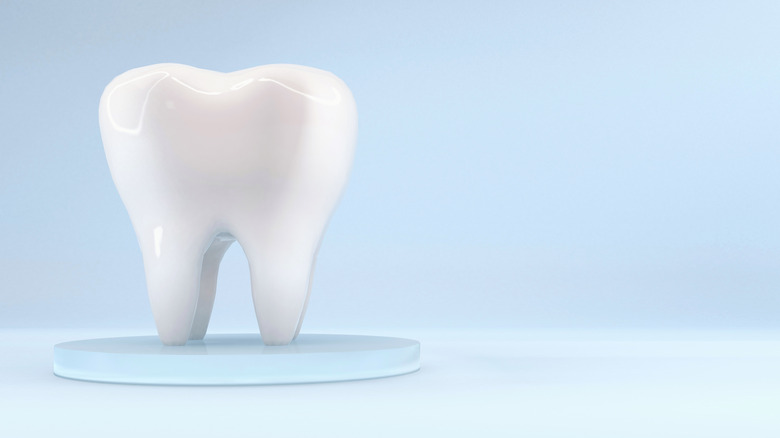A Science Fair Project On Tooth Decay
Healthy teeth are vital when you chew food, which is important for digestion. They make it easier for our mouths to form words, and — let's not forget — they make radiant smiles. Because teeth are so important, tooth decay can be a serious problem. A science fair project provides an opportunity to demonstrate how tooth decay happens and how to prevent it. You'll need to create many samples for this project, and you probably don't have a collection of teeth for them. Don't worry. Eggshells are a great substitute, and you can get as many of those as you need.
Causes of tooth decay
You've probably heard that sweet foods are a major cause of tooth decay, but that leads to two important questions with demonstrable answers. The first question is, "Does the sugar in these foods cause the decay or is it something else?" The second question is, "How do you prevent decay?" To answer the first question, soak eggshells in a variety of solutions that may or may not cause decay. Eggshells are a good substitute for teeth because they are made from chemicals similar to those that form tooth enamel.
You can choose the solutions based on what you think are the most likely causes of decay, but one of the solutions should be pure sugar water, because you specifically want to know if sugar is the culprit. Here are some other possibilities: cola, mineral water, lemonade, milk, and vinegar. Lower your eggs into mason jars filled with your choice of solutions. Let the samples sit for a week and then note the condition of the eggshells and write down the results.
You'll probably notice that the eggshells that soaked in cola and vinegar are the most affected. In fact, there may be nothing left of them. On the other hand, the eggshells in mineral water and sugar water are mostly unaffected, while those in lemonade and milk may or may not show signs of decay.
The explanation
Dentists warn about sweet foods because sugar feeds bacteria living in a layer of plaque on the surface of tooth enamel. These bacteria create acids through their metabolism, and it's the acids that cause decay.
Cola contains phosphoric acid, and vinegar contains acetic acid. Both acids are concentrated enough to soften and partially dissolve eggshells. Sugar water and mineral water aren't acidic, so the eggshells in these liquids should be unaffected. Lemonade contains citric acid, and milk contains lactic acid, but these are less concentrated than the acids in cola and vinegar, so you may or may not see damage to the eggshells immersed in these liquids.
As a follow-up, you might let the eggshells in the milk and lemonade sit for a while longer to see how long it takes for them to show signs of decay.
Preventing decay
Besides cleaning your teeth regularly, is there any way to prevent decay? Dentists recommend fluoride, but does it really help? Find out for yourself with eggshells and two jars filled with vinegar. Coat one eggshell completely with gel fluoride toothpaste and put it in one jar, and then put an uncoated eggshell in the other jar. Watch for signs of decay on the uncoated eggshell, and when you see them, note the condition of the eggshell you coated with toothpaste. If fluoride works, you shouldn't see any decay.
Follow up this demonstration by allowing the coated eggshell to remain in the vinegar to see how long it takes to start decaying.
